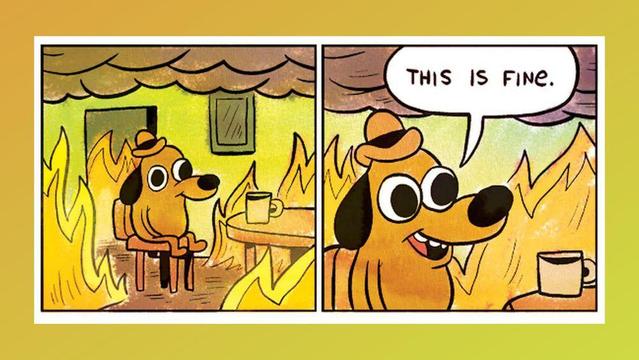🧵
🧵
People are in economic distress. They’re hurting and uncertain. But the ability to connect what's happening to their actual lives, to correctly attribute the cause, seems beyond most people's ability/willingness to look reality in the eye.
🧵
I think covid is what actually broke us. The preference for unreality had been going strong for a minority, but covid is when it broke containment and the *majority* of people NOPE'd out of reality and truth-seeking.
The triumph of normalcy bias.
No reality, no truths, just meme.
🧵
Now the fash will simply delete the data.
Stop tracking the weather.
Fire the scientists.
Housing insurance will double but no one will attribute it to climate change.
No reality, no truths, just scapegoats.
🧵
I'm the hopepunk lady but damn.
This orgy of conspiracy theories & inability to properly assign blame...this short-circuiting of humanity’s survival instinct, abetted by the elites hacking human psyches & manipulating people unwilling/unable to sort truth from lies...
This way lies darkness.
/🧵

The Sound - New Dark Age (HQ)
I have started referring to the polycrisis as an "obligations crisis" among my friend group. Underpinning all of this crises is the simple fact that we have more obligations than we can actually service. The environment, the healthcare system, the housing system, our parents retirement accounts, our governance structures, etc.
The only true solution here requires a series of complex negotiations and some new Grand bargains around which obligations we are going to meet. And how we're going to meet them. This is a lot of change and it is serious change and it is heaped upon an overworked populace who struggle to meet their voting obligations every 2 to 4 years.
And I understand why people give up. They don't have the energy or the mental capacity left at the end of the week to actually deal with these big decisions. Nor do they want to adjust their life decisions to accommodate new deals...
@susankayequinn We can blame billionaires for attempting to hack the human psyche. And I think there's some truth in the harm of the system of lies we're fed.
But take 100 median humans, and who all meant well, and ask them to reorganize to solve the polycrisis. Give them a magic wand and ask them for solutions. Then ask them if they would actually implement those solutions.
I strongly suspect most of them would drop out of the process simply by virtue of the overwhelming complexity. And even those that remain would struggle to agree on both the trade-offs they were willing to make and the ones they were willing to impose.
The system of lies we are fed are definitely bad. But the system of truths we need to hear are probably more overwhelming. //
@gatesvp the category error is thinking everyone has to do this individually. That’s actually the source of the problem: isolating everyone and giving them impossible goals and saying you’ve failed now try harder.
The way to win is not to play that game. To change the game.
@susankayequinn @gatesvp You change the game by deliberately deciding what to do with your time.
We need to work in jobs that solve the problems. We decide that as individuals every.single.morning.
But I'm not actually calling on people to act individually for solutions. What I want from my fellow humans is for them to collectively decide that they are ready to make changes.
The most popular party in the last US election was the "I don't care party". There are more eligible voters who abstained than people who voted for either Trump or Harris. We don't solve our collective problems if the most popular collective response is 🤷♂️.
We have tools for collective actions. We have boards and committees and unions. We have elections and town halls and legal challenges. We have public budgets and public reporting requirements.
Yes, it is an individual action to show up to a collective action event. But if we can't show up to collective action events, then we're unlikely to get collective action solutions. Right?
If we can't get 60 or 70% of the population to show up to fix climate change, then I'm not really clear on what else we do?
@gatesvp the thing to do is ask “why don’t they show up for collective action?” Folks outside the US underestimate both the relentless work grind & cultural messaging that says “you’re on your own” here. And also “nothing you do (collectively or even individually) to change things matters”. It makes me crazy how entrenched the belief that voting doesn’t matter is—a belief that’s fed by forces who benefit from you staying home.
Reimpowerment of people is critical cultural change.
@gatesvp @susankayequinn
This is a good toot.
There are plenty of people to work on the polycrisis however, you don't even need consensus. Just focus one group of people on governance, another on plastic pollution, another on electrification, etc. 8 billion people (although about 5 billion too many) should be plenty to fix things.
We do need *some* overall consensus because the locally right way for each group to solve its one-fifth of the poly crisis is to claim one-quarter of our available energy to do it. And then we’re still in the hole.
@clew @JeffC1956 @susankayequinn
Jeff, I think you may be inadvertently underscoring the scope of the challenges here.
We can't just ask one group of people to solve the transport problem, because it's deeply connected to the energy production problem and the housing problem. When I use the term Grand bargain, it's because we need to make broader agreements that cut across these concerns.
So you have to set some targets. Say something like "all dwellings should be net Zero to operate by 2040" and "light duty vehicles will be net zero to operate by 2035". But you also have to figure out who's going to pay for these targets.
Most scientists would agree that my targets above are too slow. But most engineers and economists would argue that those targets are unachievable without government level labor interventions. Mobody would agree how to pay for it. Most homeowners would struggle to afford basic climate change retrofits, let alone a net zero retrofit.
Multiple parties must agree to split the pain.
Now you see why I call myself a collapsonaut. You are logically correct, and at the same time what you ask is sociologically impossible. It's similar to the UN COP conferences: folks agreeing on common targets more to placate than to actually achieve. We over-consume; the conflict of resources between cleaning the environment and supporting the elderly is impossible to resolve. We need to plan for minimum viable populations to survive after a population collapse.
@JeffC1956 @clew @susankayequinn
Look Jeff, if you want to watch the world burn and write fun stories about it to get through the day, that's your prerogative. I guess it's easier than showing up at Town Hall or talking about the trade-offs you're personally willing to make to improve life.
But if it's truly your deep desire to watch 6B people die, you're kind of just writing your own comic book villain origin story. You're kind of the reason we're struggling to get a new Grand Bargain.
CC: @susankayequinn@wandering.shop
Cy: "we did fine for hundreds of thousands of years"
Me: looks up child mortality statistics for most of those years
Given what we have today, I would not say that we were "fine" a thousand years ago. Is there a reason you think the child mortality from say, 1789, was a good thing? Or are you just trolling because you don't have a more useful contribution here?
And I didn't mean a thousand years ago. The 1700's were the onset of the Industrial Revolution and the height of European Colonialism, one of the most horrific periods in human history. Claiming that proves it's impossible to figure out how to live well is... a bit defeatist, I'd say. It really isn't difficult to live well. There are just people, working for wealthy elites, making it hard to live well. Just like in 1789.
CC: @susankayequinn@wandering.shop
The reason we have reduced childhood and maternal mortality is because we have improved systems for healthcare and food distribution and delivery. Those systems exist because of other underlying systems like roads and fuel delivery and medical boards and universities.
When I say the polycrisis is an "obligations crisis", I am talking about our obligations to maintain those systems.
You say: "it isn't difficult to live well"
But in my mind, modern medicine is a requirement for living well. AND modern medicine is difficult, it is complicated.
Is there some part of that you disagree with? Do you not want modern medicine, or do you just think it's really simple?
CC: @susankayequinn@wandering.shop
@gatesvp @susankayequinn It's a generous sentiment, but if people chose the purpose of their overwork vs. just trying to make ends meet, your "choice" wouldn't be one.
We need to stop doing asshole things for assholes 80 hours per week just to maintain the pretense our retirement savings are going to mean anything.
There are plenty of green energy jobs.
There are public jobs open in just about every country to support more affordable housing.
There are jobs in healthcare that have influence.
@PedestrianError you're right — the covid denialism was much more widespread and predated the covid pivot to unreality. I think what made covid so vivid was how sudden it was and how obviously surreal the reactions became.
Ironically, belief in humans causing climate change has actually moved substantially in the *correct* direction in the last 10 years even if not enough people are taking action.
Climate denial was very specific. This blank denial of reality seems new.
@hal_pomeranz people have to demand the truth but instead they lap up lies
That’s a choice and people have to start taking responsibility for it
I agree.
Everyone gave up after that.
Now its live fast, consume what's left of the world and fuck the future...
@susankayequinn I agree. Except I think it was not so much a matter of breaking us, as of revealing how many of us were already broken.
This is why I call #COVID19 the Plague of Judgment.
MENE. TEKEL. #COVID19.



